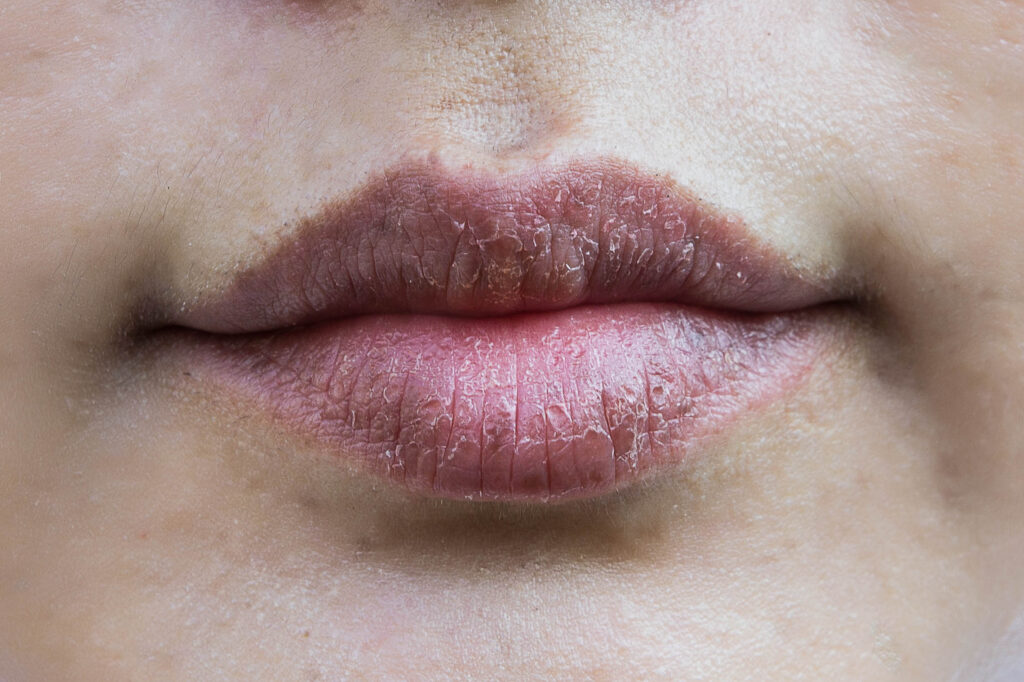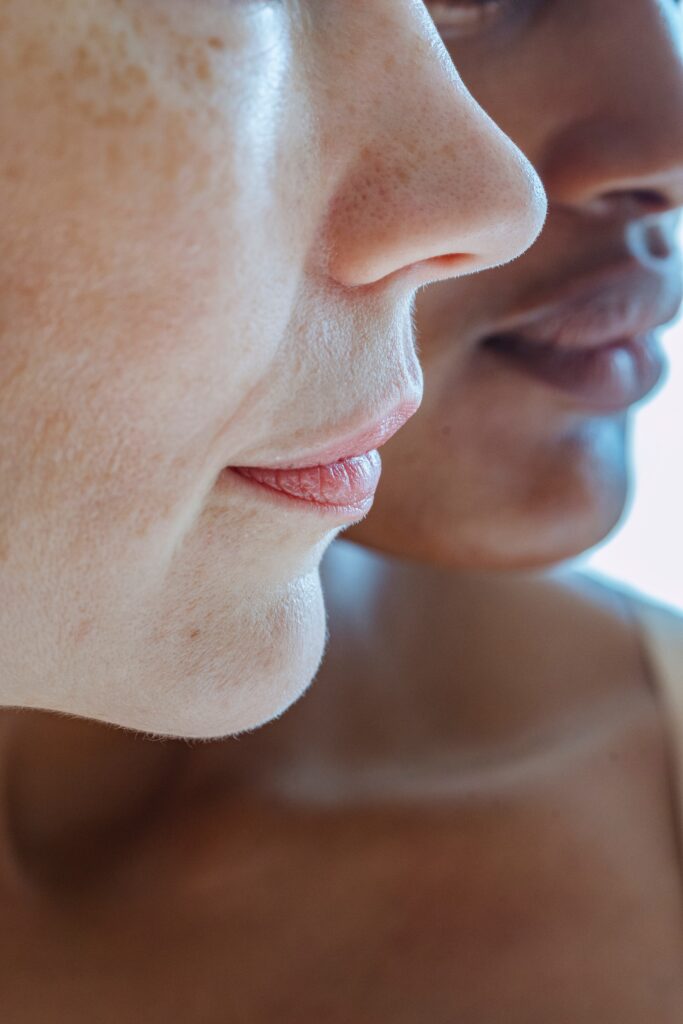Chapped Lips
Chapped lips are an inflammation of the skin on the lips. They appear as dry, cracked lips and can feel quite uncomfortable – even painful, depending on the severity. Despite mostly being known for occurring during the winter, chapped lips can happen at any time of the year, affecting everyone. Some people are more prone to chapped lips, however.
To manage cracked lips, you must understand the causes and put effort into lip protection. To help below is everything you need to know about chapped lips, from the most common causes to the best treatment options.
What Causes Chapped Lips?
Chapped lips have a variety of causes, mainly including lifestyle choices and environmental factors. Here are some of the most common:
Dry Weather
Dry weather can cause very dry lips, which makes them chapped. That’s why chapped lips are more common for many during the winter season.
Low Humidity
If the air is dry, your lips become dry. Spending too long in a low humid environment can exacerbate dry lips and cause them to chap.
Dehydration
Drinking enough water is crucial for your entire body, including your lips. If you are dehydrated, you will end up with dehydrated lips that are too dry and cracked.
Picking and Licking Lips
If you have a piece of loose skin on your lips and you pick it, the flakiness will only get worse. Picking may also cause bleeding chapped lips. Licking your lips is just as harmful. The constant licking will lead to dryness and turn into sore, chapped lips.
Irritating Lip Products
Your chapped lips may be caused by an irritant, such as an irritating lip product. Check the ingredients of your lipstick, chapstick, and other lip products. If chapped lips only occur after using a particular product, stop using it and see if it clears.
Excessive Sun Exposure
Excessive sun exposure won’t only dry out your lips, but it can also lead to sunburn. Sunburn actively harms your lip’s skin, causing dryness, peeling, and sensitivity. A sunscreen lip balm is essential when spending time in sunlight.
Malnutrition
Some deficiencies cause chapped lips – in particular, vitamin B-12 (and other B vitamins).
If you are deficient in B-12, your lips will have a hard time healing, so even if you treat the symptoms, you may still experience dry, cracked lips. Consider that malnutrition may be the cause.
The Symptoms of Chapped Lips
How do you know that you have chapped lips? Fortunately, it is usually pretty obvious. Here are the symptoms:
Dry Lips
Dry lips are a common symptom of chapped lips. You will usually feel it before you see it – it will feel dry and tight.
Cracking
Cracking, split lips are another common symptom. You will notice cracks on the lips, and they may feel sore.
Bleeding
In some cases, chapped lips can start to bleed. This is usually when chapped lips are severe and have been left untreated for a while. Often, the bleeding comes through the cracking in the lips.
Peeling
If you experience peeling lips, the chances are your lips are chapped. It will usually feel sore. You should never help peel the skin, as this will prolong the healing and cause more damage.
Burning & Stinging
Chapped lips often feel like a burning and stinging sensation. Don’t ignore this – it’s a sign of chapped lips and requires extra lip care.
If you experience these symptoms, it’s a sign that you have chapped lips. Don’t worry – there are plenty of treatment options available. With the right lip care products and treatments, you likely won’t have to deal with chapped lips for long.

Treatment & Prevention Chapped Lips
Use these methods to treat and prevent chapped lips.
Lip Balm
Lip balm is made of a wax-like substance and is used to moisten the lips. It usually comes in a tube, making for an easy application. To protect your lips and provide them with much-needed moisture, apply lip balm daily. This will help both prevent and treat chapped lips.
For especially dry lips, use a fat lip balm such as Decubal Lips and Dry Spots Balm. This oily, soothing product provides intense moisture to problem areas, which will help your lips heal quickly.
Lip SPF
Applying SPF to your lip is just as important as SPF for your face and body. Too much sun exposure damages your lips, so apply it whenever you go outside.
Cover the Mouth
Whether you are spending time in the blazing heat or the shivering cold, cover your mouth when the weather is extreme. Doing so will protect your lips from the elements.
Drink More Water
Avoid dehydrated lips that lead to chapped lips by drinking plenty of water. Carry a water bottle around with you to make this easier. It will help hydrate your lips as well as every other part of your body.
Avoid Peeling the Skin
If you find yourself picking or peeling the skin on your lips, you must squash that habit as soon as possible. If you pick at your lips when you don’t have chapped lips, it may cause them. If you do it when you already have chapped lips, your lips will only get worse and more sore.
A useful way to stop the habit is by applying something to the lips – either a lip balm or even lipstick. You’ll be less inclined to touch them that way. An aloe vera lip balm will also help the healing process.
Use a Humidifier
If you live in a low-humid climate, invest in a humidifier to prevent the air from getting too dry and causing chapped lips. Over time, it will make a real difference.
Adjust Your Diet
Adjusting your diet can help relieve the symptoms of chapped lips and help stop them from returning. A B vitamins deficiency may be the cause of your unhealing cracked lips. Adjust your diet to include more B vitamins, or consider taking vitamin pills to up your intake.
Visit a Dermatologist
If your dry, cracked lips don’t get better with home treatments, it is time to visit a dermatologist. The dermatologist can determine what is causing your chapped lips and what treatments are best. They will likely test you for cheilitis, too – a more severe form of chapped lips.

What is Cheilitis?
Some cases of chapped lips might be cheilitis. Cheilitis is an acute or chronic inflammation of the lips, which means it is either very severe or it doesn’t go away. It requires more specialist treatment – usually from a dermatologist or doctor.
Types of Cheilitis
There are several types of cheilitis. There is angular cheilitis, which appears as cracked skin in the corners of the mouth. It is most common in the elderly and people with health conditions such as diabetes. Excessive salivating can make it worse.
Other types include actinic cheilitis – which is mainly caused by sun exposure – exfoliate cheilitis, and glandular cheilitis. A dermatologist can determine which one a person suffers from.
Causes of Cheilitis
The causes of cheilitis include:
- An infection
- Lip picking
- Allergies (such as metals, preservatives, and fragrances)
- Sun exposure
- Vitamin deficiencies (including vitamin B-12)
Symptoms of Cheilitis
Many cheilitis symptoms are the same as chapped lips, only a little more severe or ongoing. They include:
- Dryness
- Sore Cracked Lips
- Redness
- Tenderness
- Swelling
- Crusting in the Corners of the Mouth
- Discoloration on the Lips
Treatment for Cheilitis
If you have severe chapped lips and think that it might be cheilitis, visit a dermatologist or doctor. They can perform a patch test, swab tests, and a biopsy to determine the cause of your symptoms and help come up with the right treatment.
Treatments usually include avoiding certain irritants and topical treatments. For more severe cases, treatment might include cryotherapy and surgical excision.
Your dermatologist will also recommend the best product to use. Make sure you use the dermatologist recommended lip balm every day.
Chapped Lips FAQs
What’s the Best Lip Balm?
Choose Decubal Lips and Dry Spots balm for sensitive lips that require a little extra care. In the end, the best lip balm is the one that works for you.
How Often Should I Apply Lip Balm?
You should apply lip balm multiple times a day. Whenever you feel like your lips are dry, apply it again. Keep it on your person so that you never have to deal with dry lips.
How Do I Make Chapped Lips Go Away Quickly?
Use a hydrating, non-irritating lip balm and apply it often. Slather it on. Also, drink plenty of water and stay out of the sun.
What Deficiencies Cause Chapped Lips?
The biggest deficiency that causes chapped lips is B vitamins. Vitamin B9, B2, B6, and B12 are known to cause chapped lips.
Why Are My Chapped Lips Not Healing?
If your chapped lips aren’t healing, you may not be using the right treatment. If it persists, though, there might be an infection, so you must see a dermatologist or doctor.
Are Chapped Lips Contagious?
No – chapped lips are not contagious. It’s better not to kiss anyone until it’s fully healed up, though, for comfort’s sake.
What Natural Remedies Help Chapped Lips?
There are many natural remedies for chapped lips – many of which you may already have at home. They include honey coconut oil, petroleum jelly, rosehip oil, aloe vera, and cucumber.
Why Do My Lips Keep Peeling?
Chronic peeling and chapped lips may be a sign of cheilitis. It might also be because you keep peeling your lips. See a dermatologist or doctor if your lips are not healing.
Links & Sources
- https://ods.od.nih.gov/factsheets/VitaminB12-HealthProfessional/#:~:text=In%20the%20United%20States%20and,older%20than%2060%20%5B33%5D.
- https://www.medicalnewstoday.com/articles/vaseline-on-face#is-it-safe
- https://homesteadandchill.com/natural-lip-balm-recipe/#:~:text=TIP%3A%20To%20measure%20by%20weight,1%3A4%20by%20weight)
- https://www.pennmedicine.org/updates/blogs/health-and-wellness/2019/august/aloe.
- https://www.bustle.com/style/how-to-stop-picking-your-lips-expert-tips
No products found